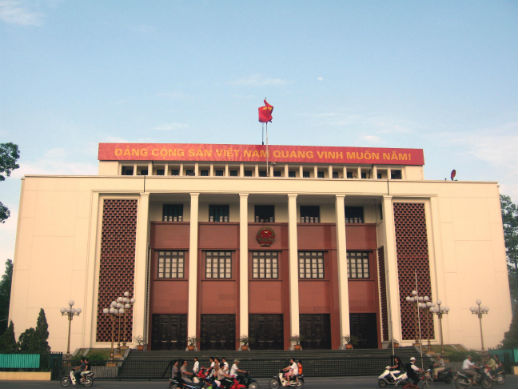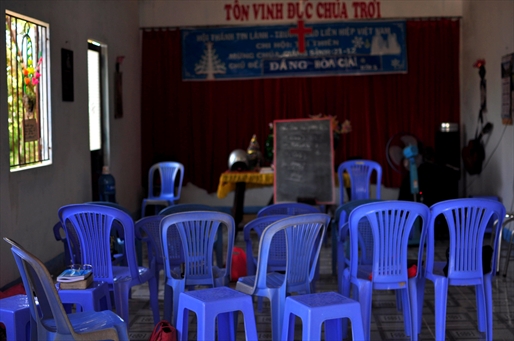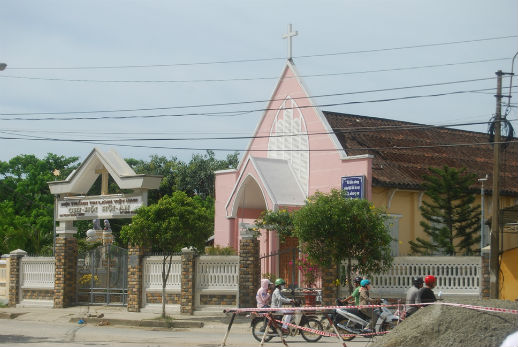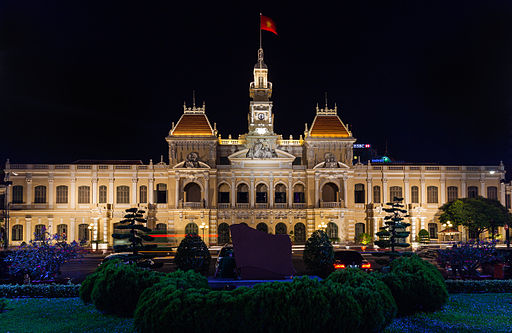
The Socialist Republic of Vietnam is drafting a “Law on Belief and Religion,” for passage in the National Assembly in 2016, and possibly this year. It is almost inevitable the new law will disappoint proponents of universal human rights.1
Diverse religions and religious practices flourish in communist Vietnam. Religious believers far outnumber the government figures on the number of people who practice religious faith. Yet Vietnam maintains restrictive and controlling managerial policies, some quite harsh, especially toward religions that are feared to have political influence, including the Catholic and Evangelical Christian traditions, mistakenly still deemed Western.
A deep, politically-constructed narrative called Dai Doan Ket, or the Great National Unity, appears to be the standard against which religions are tolerated and deemed to be sufficiently conformed to Vietnamese tradition and culture. Dai Doan Ket, nebulous though it may be, tries to define a national identity, a common culture and even a spiritual bond. Rights are relativized in reference to support for the Dai Doan Ket. Some are hopeful that globalization will dilute DDK thinking2.
The draft law . . . adds even more management minutia into one big, intimidating bundle.
This Dai Doan Ket standard for meting out space for religions differs radically from Western, human-rights thinking, which holds that fundamental human rights are universal, and which dominates international standards, as in the Universal Declaration of Human Rights. This wide difference helps explain why Vietnamese authorities and Western diplomats or advocates often talk past each other in the area of human rights.
Strongly influenced by this Dai Doan Ket paradigm, the proposed new law is the long-promised, penultimate legislation in the area of religion. It is being widely discussed, and, in the controlled and limited way of Vietnam’s government, it is being circulated for input among various segments of society including some religious groups.
A second document, much less noticed than the draft law, is of equal importance in indicating the direction of religious freedom in Vietnam. It is the Prime Minister’s Decision 06/2015/QD-TTg, dated Feb. 12 and carrying the cumbersome title “Defining the functions, responsibilities and authority, and the organizational structure of the Committee of Religious Affairs within the Ministry of the Interior.”3
It is hard to be optimistic about the impact of these two measures. Vietnam continues to view and treat religion as a social problem and potential threat to national security. This view has produced a very extensive management bureaucracy, the Committee on Religious Affairs. By prime ministerial decision, its role is being clarified and even more firmly entrenched. The draft law confirms micromanagement of religion as it gathers up previous ordinances and related implementing decrees, and adds even more management minutia into one big, intimidating bundle.
Read more: A more hopeful view of Vietnam’s reforms

The Vietnam idea: From eradication to containment
With the planned promulgation of the new law, the area of religion is being elevated to “law” for the first time. Since the communist victory and reunification of Vietnam 40 years ago, religion has been governed by a series of quite arbitrary government decrees. A shift occurred in the middle of the 2000s decade when in 2004 the National Assembly passed an “Ordinance on Belief and Religion,” a measure one rank higher than a decree. The ordinance was followed by an implementing Decree 22 in 2005, which was replaced by a revised Decree 92 in January 2013. A special prime ministerial directive concerning Evangelicalism was also issued, in March 2005. Together, these documents were called the new religion legislation.
The ordinance and related implementing documents were issued largely in response to strong US leverage and pressure4 surrounding Vietnam’s compelling need to join the World Trade Organization for economic betterment. To qualify for membership, Vietnam first had to be removed from the US’ blacklist of the world’s worst religious liberty offenders, so Vietnam had to do something significant.
Some registered Evangelical groups wonder openly if it there are real benefits to registration.
The promise of the new legislation was to provide for registration of churches and religious organizations, and this was supposed to give more space and freedom for registered groups. It has turned out to be “religious freedom by micro-management” and a disappointment to many religious groups in Vietnam as well as to religious liberty advocates who had hoped for more progress.
The new religion legislation did mark the decline of harsh, widespread, government-sponsored campaigns to force recantations and even to try to “eradicate” Evangelical Christianity5. Whatever the legislation said, the goal driving government practices regarding Evangelical Christianity shifted from eradication to containment. This was surely an improvement, but the containment policy in the intervening years still resulted in harsh treatment for ethnic minority Christians, both in the Central Highlands and in the Northwest Mountainous Region.
Overall, the promise of registration for churches has been a disappointment, both in numbers of churches registered and in benefits. House church leaders report that registration has been denied to more than half of all Evangelical congregations6. The most common form of registration denial has been for authorities to simply ignore applications. Not having registration means vulnerability to various kinds of government coercion. Examples: disruption of religious worship services and ceremonies; arrests and detainment and sometimes public shaming of leaders; shutting down of meeting places; and limits on travel for leaders to curtail evangelism. The situation has also created considerable awkwardness in relations between registered and unregistered Evangelical groups.
The requirements for a church organization to register, ostensibly streamlined in 2013’s Decree 92, are unrealistic if not preposterous. If a church organization applied the day Decree 92 was effective, Jan. 1, 2013, and it met all the requirements, and the government replied in a timely manner, which it rarely does, it would be 2036 before registration could be achieved. This includes a 20 year period during which the unregistered church must operate stably and not violate “the law.” An unregistered church is by definition illegal.
Nine Evangelical denominations, all of which were required to show an origin in Vietnam before 1975, have achieved legal recognition status. Nevertheless, some are experiencing serious problems in their churches as local officials harass and pressure them – especially among ethnic minorities. Reporting requirements are also onerous. It is still an “ask and receive” system in which it takes an unknowable and very long time to get some permissions which should be routine and quick. The UN Special rapporteur observed that “official registration status with the Government was no guarantee that freedom of religion or belief is fully respected.”7 Some registered Evangelical groups wonder openly if it there are real benefits to registration.

The proposed solution: More regulation
In answer to clear, if unadmitted, deficiencies of existing legislation, and to counter regular criticism on religious restrictions, Vietnam is proposing an ultimate law. It is based on Article 24 of Vietnam’s 2013 constitution, which says,
- Everyone has the right to freedom of belief and religion, and has the right to follow any religion or to follow no religion. All religions are equal before law.
- The State shall respect and protect the freedom of belief and religion.
- No one may violate the freedom of belief and religion, nor may anyone take advantage of a belief or religion in order to violate the law.
Article 14, section 2 of the latest constitution defines the limitations on religious and other freedoms. The section implies it narrows the grounds for restrictions, but in fact they remain wide and allow for much arbitrary interpretation:
2. Human rights and citizens’ rights may not be limited unless prescribed by a law solely in case of necessity for reasons of national defense, national security, social order and safety, social morality and community well-being.
This section provides the basis to derogate rights and freedoms, including religious freedom. Consistently critiqued by human rights advocates in the past, this provision remains firmly in place in the 2013 constitution.
There is no evidence in the draft law of a change in the fundamental paradigm about religion as a problem to be managed.
The entire draft law, 29 pages long, with 12 chapters and 72 articles, may in fact be described as a limit placed on Article 24. Nearly every item whittles away at the plain-language freedom guarantees contained in points 1 and 2. And more restriction and limitations are coming: Some 25 of the 72 articles end with a statement saying the government is responsible for preparing the rules and procedures for implementing the article. Another frequent closing phrase in the articles of the constitution is “according to the law,” usually unspecified, thus allowing officials to arbitrarily define what that law might be. This further erodes the freedoms ostensibly grounded in the constitution.
The Government Committee on Religious Affairs suggests, on its website8, that the country’s religion law has improved in several areas. The use of “everyone” in Article 24 of the 2013 constitution is cited as an important advance from use of “the citizen” in the 1992 constitution. Item 2 of Article 14 in the current constitution is said to be an improvement because it is explicit about the reasons for limiting freedom. Elsewhere, however, Article 6 is laced with 13 “absolutely forbiddens,” which communicates overarching negativity, and is frequently referenced in subsequent articles.
The draft law is said to simplify the registration process for unregistered local groups or churches, and denominations. It has reduced, from 20 to 10, the number of years an unregistered (not yet legal) church must operate legally and stably.
The UN special rapporteur for belief and religion, Heiner Bielefeldt, who visited Vietnam in mid-2014, reported major concern for the many unregistered churches and other religious groups about which the Vietnamese authorities are often condescending and dismissive.
“A litmus test for the development of freedom of religion or belief is in the conditions of independent or unregistered religious communities,” Bielefeldt said in his report to the UN Human Rights Council. “The exercise of freedom of religion or belief cannot be rendered dependent on any particular act of administrative approval; as a universal human right, it is inherent in all human beings, prior to any acts of registration or official recognition.”9
Bielefeldt observed that the practice of religion by unregistered communities remains “restricted and unsafe.” This includes the large number of unregistered house churches. The draft law contains the possibility of their registration, but so did prior regulations. In light of what Bielefeldt calls the “generally dismissive, negative attitude toward the rights of minorities and individuals practising religion outside the established channels,” it remains to be seen if the new law will be accompanied by a changed attitude which includes these long-marginalized groups.
The posting by the Government Committee on Religious Affairs assumes and implies that clarifications in the new law equal “improvements.” If so, they are much more improvements to tightly manage religion than they are moves toward expanded freedom. There is no evidence in the draft law of a change in the fundamental paradigm about religion as a problem to be managed. Such a paradigm change, all observers agree, is necessary for genuine progress toward freedom to occur.

A massive bureaucracy
The Committee on Religious Affairs, a large bureaucracy created by the Party and State to manage religious matters, resides within the Ministry of Interior, sometimes translated as the Ministry of Home Affairs.
The location of the religious affairs committee firmly within this ministry is telling. If its position and role in the past has sometimes been unclear, no longer. The Prime Minister on Feb. 12 issued Decision 06/2015/QD-TTg, called “Regulations concerning the function, the responsibilities, the authority and the organizational structure of the Committee on Religious Affairs within the Ministry of Interior.”
Vietnam would do better to realize that less would be more.
The director of the Committee on Religious Affairs is required to be a deputy minister of the Ministry of Interior. The current head is Mr. Pham Dung, a general from the security services. There are three vice-directors. The most well-known is Dr. Bui Thanh Ha, a no nonsense colonel who also came from the Ministry of Public Security. Another, Ms. Hoang Thi Thao, in charge of the Evangelical Christianity department of the committee, recently was promoted to a higher rank in the security services. The Committee on Religious Affairs’ relationships to public security organs are not subtle. It has 15 departments including separate ones for Catholicism, Buddhism, Evangelicalism, and Cao Daism.
The prime minister’s five-page decision makes clear that the religious affairs committee is the chief agency to strategically advise the interior ministry and the entire government on religion policy and manage all religious affairs. It is a legal entity, endowed with the seal of the national Communist Party of Vietnam, and has its own budget. It reports to the Minister of the Interior and to the Prime Minister. It drafts and proposes laws and regulations to the same.
Among more than 20 “responsibilities and authority” items, the committee organizes the implementation of all religion laws and regulations. It prepares and promulgates all directives to guide the implementation of religion policy. It publicizes, propagandises and leads in the implementation of constitutional provisions for religious freedom and abuse of religious freedom. It solves all religion problems “according to the law.” It coordinates on religion matters with all other concerned government agencies. It controls the publication of all religious literature. It is responsible for the scientific study of religion policy. It trains staff to specialize in religion work.
In order to carry out all these functions, the committee maintains a huge bureaucracy that parallels Vietnam’s administrative structure. Its broad scope insures it will be strongly self-perpetuating.
Conclusion
In the area of religious freedom, Vietnam would do better to realize that less would be more. The passing of this far-reaching new law on belief and religion, with dozens of articles still requiring newly formulated implementation regulations, and the clarification and entrenchment of the Committee on Religious Affairs’ role within the Ministry of the Interior, will much more likely move the political system toward more micromanagement and control of religion rather than toward more religious freedom as internationally understood.
NOTES
(1) The Vietnamese language draft number 4 is circulating in April 2015, as this was being written.
(2) The implications of the Dai Doan Ket construct are more fully described in Monash University’s John Gillespie’s article “Human Rights as a Larger Loyalty: The Evolution of Religious Freedom in Vietnam”. Gillespie’s hopeful thesis, that Vietnam could evolve toward clear legal guarantees for full religious freedom by pressures of globalization, is, in the author’s view, too optimistic in view of developments described here.
(3) The author worked with a Vietnamese-language copy of the Prime Minister’s Decision, obtained from the Uy Ban Ton Giao Chinh Phu website.
(4) This pressure and leverage was skillfully applied by then US Ambassador-at-large for Religious Freedom, John Hanford III.
(5) See Freedom House publication “Directions for Stopping Religion”, published in 2000.
(6) Accurate statistics for religious believers are not attainable in the current social/political situation in Vietnam. There an estimated 1.5 – 1.8 million Evangelicals in Vietnam. They belong to more than 80 Evangelical organizations. The approximately 70 unregistered groups are believed by their leaders to represent well over a half of all Evangelicals in Vietnam.
(7) P. 17. “Report of the Special Rapporteur on freedom of religion or belief”; addendum on 21-31 July, 2014 mission to Vietnam, by Heiner Bielefeldt. UN Human Rights Council. January 30, 2015.
(8) From the website Uy Ban Ton Giao Chin Phu on April 9, 2015. (Translated title: “The laws concerning belief and religion now and their direction under the proposed new law on belief and religion”).
(9) P. 18. “Report of the Special Rapporteur on freedom of religion or belief” ; addendum on 21-31 July, 2014 mission to Vietnam, by Heiner Bielefeldt. UN Human Rights Council. January 30, 2015.
Reg Reimer is a professor at the Evangelical Fellowship of Canada. He was a missionary to Vietnam during the 1960s and 1970s, and has made more than 100 return trips since. He is the author of “Vietnam’s Christians: A Century of Growth in Adversity,” published in 2011 by William Carey Library.